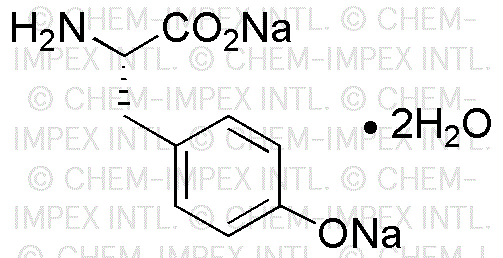L-Tyrosine disodium salt dihydrate is widely utilized in research focused on:
- Nutritional Supplements: This compound is often included in dietary supplements aimed at enhancing mood and cognitive function, as it serves as a precursor to neurotransmitters like dopamine.
- Pharmaceuticals: It plays a role in the formulation of medications for conditions such as depression and anxiety, providing a natural alternative to synthetic drugs.
- Food Industry: Used as a flavor enhancer and nutritional additive, it can improve the taste profile of various food products while also contributing to their nutritional value.
- Cosmetic Products: Its antioxidant properties make it a valuable ingredient in skincare formulations, helping to protect skin cells from oxidative stress and promoting overall skin health.
- Animal Feed: This compound is incorporated into animal nutrition to promote growth and improve overall health in livestock, ensuring better productivity in the agricultural sector.
General Information
Properties
Safety and Regulations
Applications
L-Tyrosine disodium salt dihydrate is widely utilized in research focused on:
- Nutritional Supplements: This compound is often included in dietary supplements aimed at enhancing mood and cognitive function, as it serves as a precursor to neurotransmitters like dopamine.
- Pharmaceuticals: It plays a role in the formulation of medications for conditions such as depression and anxiety, providing a natural alternative to synthetic drugs.
- Food Industry: Used as a flavor enhancer and nutritional additive, it can improve the taste profile of various food products while also contributing to their nutritional value.
- Cosmetic Products: Its antioxidant properties make it a valuable ingredient in skincare formulations, helping to protect skin cells from oxidative stress and promoting overall skin health.
- Animal Feed: This compound is incorporated into animal nutrition to promote growth and improve overall health in livestock, ensuring better productivity in the agricultural sector.
Documents
Safety Data Sheets (SDS)
The SDS provides comprehensive safety information on handling, storage, and disposal of the product.
Product Specification (PS)
The PS provides a comprehensive breakdown of the product’s properties, including chemical composition, physical state, purity, and storage requirements. It also details acceptable quality ranges and the product's intended applications.
Certificates of Analysis (COA)
Search for Certificates of Analysis (COA) by entering the products Lot Number. Lot and Batch Numbers can be found on a product’s label following the words ‘Lot’ or ‘Batch’.
*Catalog Number
*Lot Number
Certificates Of Origin (COO)
This COO confirms the country where the product was manufactured, and also details the materials and components used in it and whether it is derived from natural, synthetic, or other specific sources. This certificate may be required for customs, trade, and regulatory compliance.
*Catalog Number
*Lot Number
Safety Data Sheets (SDS)
The SDS provides comprehensive safety information on handling, storage, and disposal of the product.
DownloadProduct Specification (PS)
The PS provides a comprehensive breakdown of the product’s properties, including chemical composition, physical state, purity, and storage requirements. It also details acceptable quality ranges and the product's intended applications.
DownloadCertificates of Analysis (COA)
Search for Certificates of Analysis (COA) by entering the products Lot Number. Lot and Batch Numbers can be found on a product’s label following the words ‘Lot’ or ‘Batch’.
*Catalog Number
*Lot Number
Certificates Of Origin (COO)
This COO confirms the country where the product was manufactured, and also details the materials and components used in it and whether it is derived from natural, synthetic, or other specific sources. This certificate may be required for customs, trade, and regulatory compliance.


